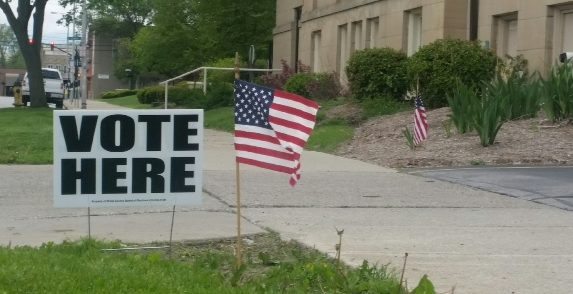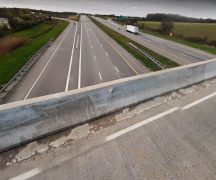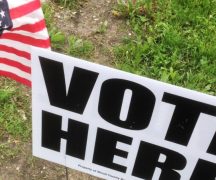Voting rights advocates have identified several changes they believe would make it easier for Ohioans to vote this November.
With time running out for the state legislature to enact laws impacting the 2020 General Election, these advocates are pleading for Secretary of State Frank LaRose to take action.
LaRose is the statewide official who oversees Ohio’s election system, and he even agrees with several of the changes proposed. But, despite advocates’ insistence to the contrary, LaRose does not feel he has the authority to take these actions unilaterally.
LaRose has tried in 2020 — without success, thus far — to convince the Republican-led legislature to give him this authority.
There are three months until Election Day, though early voting begins in just two months. On Tuesday, more than a dozen groups sent LaRose a letter outlining their proposals one more time with the hopes he will act before it’s too late. Several of them, representing various churches, the Ohio Student Association, the ACLU of Ohio and the Ohio Coalition on Black Civic Participation, held a digital press conference Tuesday to share their ideas with reporters.
Here is what they want:
Online absentee ballot applications
LaRose agrees on this issue, but has resisted taking action by himself.
In Ohio, voters can elect to cast absentee ballots through the mail in the weeks ahead of Election Day. To do so, they have to first submit an application to receive their blank ballot to fill out.
Traditionally, this has meant mailing in the application to the voter’s county board of elections office. The Ohio Secretary of State’s Office intends to mail every eligible voter an absentee request form this fall, as it has done ahead of previous presidential elections.
Advocates say this back-and-forth system through the mail can be confusing and time-consuming. They want to see Ohioans have a chance to request a ballot online.
On the subject of absentee ballot requests, the Ohio Revised Code states: “the application need not be in any particular form” but should include all of the requisite voter information.
Collin Marozzi, a policy strategist with ACLU of Ohio, said this demonstrates the Ohio Secretary of State website could offer online absentee ballot applications. LaRose has asked the legislature to give him this authority.
Separately, a pair of lawsuits have been filed in relation to the absentee ballot system.
The Ohio Democratic Party has filed a lawsuit to require LaRose to allow absentee ballot requests by email. The League of Women Voters of Ohio and the A. Philip Randolph filed a different lawsuit seeking to fix the “flawed system of matching voter signatures on absentee ballots and absentee ballot applications.” As part of the existing ballot security process, some mailed-in ballots are ruled ineligible if the signatures are seen as not being a match.

Prepaid postage for mailed ballots
This is another proposal LaRose agrees with but argues he needs to be given the authority to carry out.
Advocates say making a voter locate and pay for a stamp to mail in their ballot constitutes a modern-day poll tax.
The state legislature approved prepaid postage on ballots for the primary election, which was conducted entirely by mail due to the coronavirus pandemic. Legislators have not approved such spending for the fall, and in fact a Republican-sponsored bill which passed the Ohio House of Representatives in June expressly prohibits LaRose’s office from using state funds to pay for postage.
LaRose supports the bill, though he said he disagrees with that component. The Ohio Senate has yet to vote on it.
There still leaves the option for LaRose to use federal Coronavirus Aid, Relief, and Economic Security (CARES) Act money to pay for the postage. His office has said more funding and Ohio Controlling Board approval would be required to do so.
Allow for multiple secure ‘drop boxes’ in each county
Besides mailing their absentee ballots, voters have an option of placing their filled-out ballot in a secure drop box. Each county has a drop box located at their respective board of elections office.
Advocates argue there should be more than one in each county — this would offer more convenient access; does not require a stamp; and avoids any delays related to the U.S. Postal Service.
LaRose is generally in favor of the idea. He recently told the Statehouse News Bureau the boxes would need to be placed in “secure locations” and suggested it may be too late to install more of them.
Asked about these absentee drop boxes back in May, LaRose spokesperson Maggie Sheehan told the Ohio Capital Journal that were LaRose be allowed to prepay postage, this would effectively make every USPS mailbox a free drop box.
Prevent polling place consolidation
Barring any health orders like Ohio saw with the primary election, it appears there will be in-person voting as is normal this fall.
Advocates want to ensure all polling places are kept available. They fear consolidating them would lead to busy precincts for the highly-anticipated presidential election. This could lead to long lines and crowded, unsafe voting conditions.
In June, the Jackson County Board of Elections was perhaps the first in Ohio to announce a number of polling locations would be consolidated for the fall election.
LaRose is leaving this issue up to the county offices. In his “Ready for November” plan, LaRose said: “Whether they choose to consolidate polling locations or not, they know their voters best and can determine the best option to keep people safe while running an accessible election.”
The Ohio Capital Journal reported this week the Ohio Voting Rights Coalition continues to urge leaders to adopt safe voting procedures for the General Election.
Ohio is still recruiting poll workers to assist with the November election.
Voter advocates seek equal ballot access for all
Tuesday’s conference call with reporters included a number of voices who stressed the need for providing an equal and accessible playing field for all Ohio voters.
Cleveland Revs. Brian Anthony Cash of the East Mount Zion Baptist Church and Alfred Chris Attaway of the Tabernacle Church both discussed a need for voter education and support in their areas.
“Voter suppression continues to plague this community,” Cash said, noting they will do everything they can to get voters ready for the election.
Attaway insisted Ohio leaders ensure that “every vote matters” this November.
Kalesha Scott of the Ohio Student Association noted the challenges that college students had with the mail-only primary election this past spring. She called on LaRose and others to make sure college students who may be studying from home this fall are not disenfranchised.
How might these advocates convince LaRose to take action without the legislature getting involved?
Petee Talley with the Ohio Coalition on Black Civic Participation said supporters need to emphasize these are not partisan issues. Online ballot applications would benefit all voters, as would prepaid postage.
“Voting shouldn’t cost,” Talley said about the postage issue. “It shouldn’t cost.”
Cash said “the power is in the narrative” in wanting to improve voting access.
Of LaRose, the reverend said: “You have the power, you have the authority, and you have the narrative.”
***
Also from Ohio Capital Journal:
DeWine might use former president of dark money group to lobby for nuclear bailout
Not only does he intend to keep Dan McCarthy in his administration, Ohio Gov. Mike DeWine might use McCarthy to lobby the legislature for another nuclear bailout.
McCarthy, DeWine’s legislative affairs director, is a former lobbyist for FirstEnergy who set up a dark money group that funneled millions of corporate dollars into a second dark-money group that federal prosecutors say is at the heart of the biggest bribery scandal in Ohio history.
A primary aim of the conspiracy, prosecutors say, was passage of House Bill 6, an existing bailout that DeWine earlier supported, but now wants repealed because of the scandal surrounding its passage.
“I think it’s always important in this great country of ours not to leap to any conclusions or guilt by association,” DeWine said in a Tuesday press conference. READ MORE





